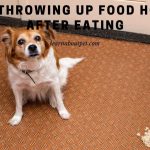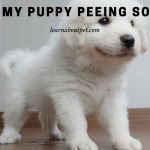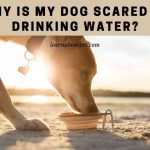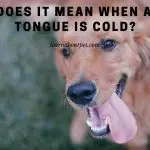As a puppy owner, you may come to realize that the puppy is shaking after eating. This is sure to cause you some concern: as you try to figure out whether it is normal, what may be causing it, what it means and what you can do about it. Read on, for answers.
Why is my puppy shaking after eating? It could be that he ate too much or too fast. It could also be that the food was too cold. Further on, it could be that the food is causing stomach upset. Or there may have been toxins in the food.
It is best to try to identify the exact reason for your puppy trembling after eating. Start at a general level: by establishing why would a puppy shake after eating.
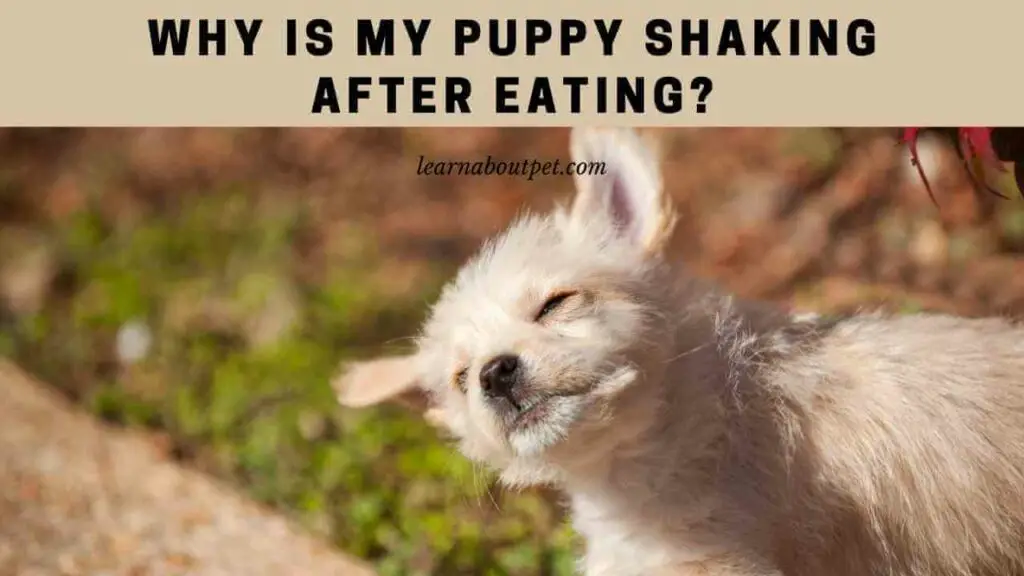
Then be more specific, and zero in on the exact reason why your puppy is shaking after meals. Then try to deal with the underlying cause, to stop the shaking.
Why Is My Puppy Shaking After Eating?
The commonest reason for a puppy shaking after eating is usually a scenario where the puppy eats too much or too fast. So the food ends up overwhelming the puppy’s digestive system. The end result is the shaking.
Another common reason for a puppy shaking after eating is the food being too cold. When a puppy eats food that is too cold, it ends up lowering the puppy’s body temperature somewhat. This can cause shaking.
At another level, when a puppy eats food that causes stomach upset, the end result can be shaking. The food itself may be alright. But if it is something entirely new, it may still cause the puppy’s (delicate) stomach to be upset. This would then lead to shaking.
More ominously, if the puppy has eaten food with toxins, it can lead to shaking.
Then again, if it is cold (climate-wise) the puppy may shake after eating. In fact, the puppy may have been shaking all along. But you only notice it after eating, when it becomes more pronounced.
To identify the exact reason for your puppy shaking after eating, you need to ask yourself several reasons. Firstly, you need to ask yourself whether it is a new behavior. Or if it is something that has always happened, whenever the dog eats.
Further, you need to ask yourself whether it happens only in certain instances (for instance, when the puppy eats certain foods). Or if it happens all the time. All in all, there are many possible reasons for puppy shaking after eating.
Is It Normal For Puppies To Shake?
Shaking is common in puppies, but we can’t term it as ‘normal’. Puppies will shake due to anxiety, excitement or fear. They will also at times shake due to low temperatures (when it is cold). Further, the puppies may shake due to illness.
In some breeds, shaking is common both in puppies and adult dogs as part of the so-called generalized tremor syndrome.
And puppies may shake after eating. This may be on account of eating too much and/or too fast. It may also be on account of eating food that is too cold. Or it may be on account of eating food that upsets their stomachs or food that has toxins.
In most cases, shaking in puppies should be cause for concern. How much concern depends on the intensity of the shaking, and other symptoms accompanying it.
For instance, if my puppy is shaking and acting weird, the level of concern would be greater than for a puppy that is only shaking.
Similarly, a scenario where my puppy keeps shaking his whole body is quite different from one where the puppy only shakes a part of the body.
In the final analysis, though shaking may be common in puppies, it nonetheless requires attention. Sometimes, it can be an indication of something very wrong. For instance, in some cases, shaking after eating may be a sign that the puppy has ingested something that is toxic.
What Does A Puppy Shaking Mean?
In general terms, a puppy shaking may mean that it is too cold. So in this case, the puppy will be shivering (which looks like shaking).
A puppy shaking may also mean that it is ill. Conditions like generalized tremor syndrome (in breeds that are susceptible for it), distemper and certain neurological disorders manifest through shaking.
A puppy shaking may also mean that it has eaten too fast and/or too much. Or it may be that the puppy has eaten food that was too cold. It may also mean that the food the puppy has eaten food that is upsetting its stomach, or is possibly even toxic.
All these are scenarios where you have the puppy shaking after eating.
The age of the puppy is a relevant factor in trying to decipher the meaning behind it. For instance, a case of an 8 week old puppy shaking all the time may have different implications from one of, say, a 3 week old puppy shaking after eating or a 5 week old puppy shaking after eating.
For instance, it is worth mentioning that puppies only reach their standard body temperature at 2-3 weeks. Therefore puppies that are any younger than that will tend to shake terribly, whenever they are in the cold.
Is It Normal For Puppies To Shake After Eating?
It is really not normal for puppies to shake after eating. True, it happens often. But that doesn’t make it normal. If you have a puppy shaking after eating, it is important to try to understand why it is happening.
You need to ask yourself: could the puppy be eating too fast and/or too much? Or could the puppy be getting food that is too cold? Could the puppy be getting food that is upsetting its stomach? Or could the puppy actually be getting food that has toxins?
All in all, you shouldn’t assume that it is normal for a puppy to shake after eating. Assuming that it is normal may breed complacency. Yet something may be going very wrong in the puppy.
If, for instance, the shaking is due to eating food that is upsetting the puppy’s stomach, long-term consequences may not be good.
The same applies if you have a situation where the puppy is continually eating too fast and/or too much. Or where the puppy is continually getting food that its body perceives as being ‘toxic’. Therefore you shouldn’t perceive it as ‘normal’.
What Causes A Puppy To Shake After Eating?
If you have a puppy shaking after eating, you will naturally want to know what causes this behavior. This leads to the question: why do puppies shake after they eat? And the answer is that there are many things that can make a puppy shake after eating.
In most cases, where a puppy shakes after eating, it is due to eating too much/too fast. So, as a consequence of eating too fast/too much, the puppy’s digestive system gets overwhelmed. The systemic effects of that ‘overwhelm’ include the shaking in question here.
Sometimes, a puppy that eats food that is too cold will end up shaking thereafter. This is similar to how a person who eats a cold ice cream often ends up shaking thereafter. The body reacts to the cold food by shaking.
At another level, a puppy that eats food that is new to its system (or food that otherwise upsets its stomach) may react by shaking. Thus, if you have a 4 week old puppy shaking after eating something it has never eaten before, this may be the reason.
That is also what may be at play in a situation where you have a puppy shaking after drinking milk.
Should a puppy eat something that is toxic, one of the manifestations may be shaking. Thus, for instance, if you have your Chihuahua puppy shaking after eating (and especially where the shaking is accompanied by other symptoms such as vomiting), this is what may be at play.

Puppy Shaking After Eating – What Does It Mean?
There are several possible meanings. It may mean that the food that the puppy ate was too cold. For instance, if you take food straight from the fridge, and give it to the puppy, chances are that the puppy will shake after eating it.
It may also mean that the puppy ate too much food or it ate too fast (or both). So the meaning of the shaking would be that its digestive system is overwhelmed. Thus if you have your Yorkie puppy shaking after eating, this is one of the possibilities to consider.
Puppy shaking after eating may also mean that its stomach is upset. Perhaps you gave it something that is new to it. Or perhaps you gave it food that wasn’t well prepared. One of the signs of an upset stomach in a puppy is shaking after eating.
Thus, if you have your puppy shaking after eating dinner, and the dinner food was something totally new to it, this may be the reason.
More worryingly, if your puppy is shaking after eating (and perhaps also vomiting or having other weird symptoms), it may mean that the food it ate was toxic.
Some compounds in it may be toxic. Or it may have started going bad: hence making it toxic. Or it may have been prepared in a manner that rendered it toxic.
Puppy Shaking After Eating Puppy Food – What Are The Possible Meanings?
In most cases, you have to look at the circumstances around the shaking. For instance, is it of sudden onset? Or is it something that always happens? Does it come alongside other symptoms (such as vomiting)? Or does it occur in isolation.
For instance, where it is happening for the first time, and the puppy has eaten a certain food for the first time, it may be due to an upset stomach. Or it may mean that there is something in the new food that the puppy’s body perceives as a toxin.
Therefore if you have been wondering why does my 6 week old puppy shake after eating something new, this may be the reason.
Where it is something that always happens, it may mean that there is a problem with your food servings. Perhaps you serve food in a manner that always encourages the puppy to eat too much or too fast. And that overwhelms its digesting system, leading to shaking.
This may be the case if, for instance, you have an 8 week old puppy shaking after eating, and where this has been happening all along.
Where it is happening in a new puppy, it may be due to anxiety or excitement. Therefore if you have a new puppy shaking after eating, this is one of the possibilities to look into.
In a case where the shaking comes alongside symptoms such as vomiting, it may be indicative of toxin ingestion.
So, for instance, if you have a 6 week old puppy shaking after eating, and the shaking is of sudden onset and it is happening alongside things like vomiting, this may be the reason behind it.
All in all, the other circumstances surrounding the shaking are likely to shed light on the possible reasons for it.
Puppy Shaking After Eating – What To Do?
The first step is to identify the reason for the puppy shaking after eating. Is it because of eating too fast and/or too much? Is it because of eating food that is too cold? Or is it because of stomach upset?
Could it be due to toxins in the food? Or could it be due something else altogether – anxiety, fear, excitement and so on?
Where it seems to be due to eating too much and/or too fast, you need to change how you serve the food to the puppy in the future. Ideally, give smaller servings more frequently. That is better than having fewer bigger servings that end up overwhelming the puppy’s system.
To discourage fast eating, you may need to invest in a slow eater dog bowl, or in a puzzle bowl for the puppy.
Where it seems to be due to eating food that is too cold, opt for warmer food. Ensure that you only give the puppy food that is (at least) at room temperature. Avoid taking food straight from the fridge and giving it to the puppy.
In a case where it seems to be due to an upset stomach, identify the culprit food/trigger food, and avoid it in the future. Also monitor the upset stomach situation. Where it seems to be particularly bad, take the puppy to the vet immediately.
In a case where the shaking seems to be due to eating toxins (for instance, where it comes alongside vomiting), take the dog to the vet straightaway.
How Do You Treat Shaking Puppy?
Firstly, you need to understand the nature of the shaking. Is it a case of a puppy shaking all the time? Or is it a case of a puppy shaking only after eating (or at other specific times)? Is it a case of whole body shaking? Or is it a case of the puppy shaking only certain parts of its body? Is the shaking of sudden onset? Or is it chronic?
After understanding the nature of the shaking, you can proceed to identify the reasons behind it. It may be due to excitement, fear or anxiety. Or it may be due to the so-called generalized tremor syndrome.
Further, it could be due to illnesses: distemper, neurological disorders and so on.
Or it could be due to eating too fast/too much, eating food that is too cold, stomach upset, eating toxins and so on.
Once you identify the reasons behind the shaking, you can put in place an appropriate treatment plan. Where it is due to excitement, fear or anxiety, the solution may be to have a dog behaviorist give therapy to the dog.
Where it is due to illnesses such as distemper, neurological disorders and so on, the solution may be to have a vet diagnose, then treat them. Treatment may include medications and procedures.
And where it is due to things like eating too fast/too much, eating food that is too cold and so on, the treatment may be by way of simply changing how you present food to the puppy.
So you start by understanding the nature of the puppy shaking: how it occurs, and the circumstances around it.
Then you figure you the reasons behind it. Thereafter treatment is initiated: which may be through behavioral therapy, medications, procedures, lifestyle changes for the puppy and so on.
Final Verdict – Puppy Shaking After Eating
There are many things that can make a puppy shake after eating. Those include eating too fast or too much, eating food that is too cold, stomach upset, ingesting toxins and so on.

Sometimes, to get the puppy to stop shaking after eating, all you need to do is change how you present food to it.
But there are instances where veterinary attention is necessary. That is for instance where the shaking seems to be due to toxin ingestion or due to some underlying medical conditions.
As a pet lover, make sure to learn about pet more and give your pet dog a good and comfortable life!

Welcome to Learn About Pet. My name is Rajkumar Ravichandran and I love all pets, travel, and amazing food. I write about my passion and personal experience caring for multiple pets in this blog! ❤️
Post Disclaimer
DISCLAIMER: THIS BLOG OR WEBSITE, "Learn About Pet", DOES NOT PROVIDE YOU WITH MEDICAL ADVICE AND IS NOT A SUBSTITUTE FOR MEDICAL ADVICE. ALWAYS GET IN TOUCH WITH YOUR PERSONAL VETERINARIAN AND USE INFORMATION HERE AS GENERAL ADVICE.
The information, including but not limited to, text, graphics, images and other material contained on this website are for informational purposes only. No material on this site is intended to be a substitute for professional veterinary advice, food recommendation, diagnosis, or treatment. Always seek the advice of your veterinarian or other qualified health care provider with any questions you may have regarding a medical condition or for pet food related questions.
